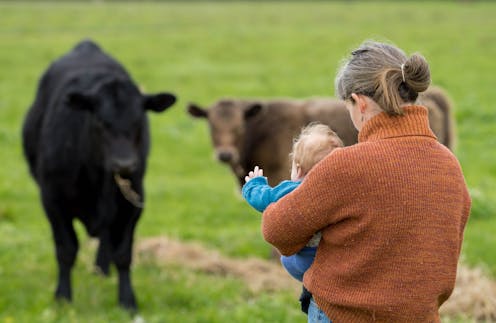British farmers will face greater challenges than Labour’s inheritance tax reforms
- Written by Neil Ward, Professor of Rural and Regional Development at the Tyndall Centre for Climate Change Research , University of East Anglia

Just months after Labour won the UK general election and ended a prolonged period of Conservative rule, rural protesters are once again taking to the streets of London. The threat to fox-hunting triggered the countryside marches[1] of the late 1990s. This year, it is the agricultural inheritance tax reforms set out in the new government’s first budget that are troubling those farmers planning to pass on assets to their children.
Agricultural property relief[2] (APR) reduces the amount of tax that farmers and landowners incur when agricultural assets are passed on, for example, after a death. Introduced in the 1980s, it had been set at 100% relief, but from April 2026 full relief will apply only to the first £1 million per person.
A tax rate of 20%, rather than the full 40% that most people would expect to pay in inheritance tax[3] on assets over £325,000, will apply to agricultural claims.
Farmers are asset-rich and often cash-poor, so there is much talk of some of them having to sell off land. However, for a married couple, making use of various nil-rate exemptions, an estate of up to £3 million could still be passed on free of tax.
Much of this benefit currently is being captured by a small number of very large estates. Government figures suggest the top 7% of agricultural estates[4] (the largest 117 claims in the most recent year’s data) account for 40% of the total value of APR – a cost to the taxpayer of £219 million. The largest 2% of estates (37 claims) account for more than one-fifth of the total value (costing £119 million[5]).
Agriculture enjoys all sorts of special treatment and exemptions from rules that other sectors face – these are not widely understood, but have included cheaper diesel, planning exemptions and assorted tax breaks[6]. The APR reforms do not remove the special treatment completely – but they reduce its scope.
Read more: What Labour's first budget means for wages, taxes, business, the NHS and plans to grow the economy – experts explain[7]
Debate has raged in parliament and across the media about the number of farms likely to be affected. Critics of the government put it in the tens of thousands[8]. The Treasury says the figure is fewer than 500[9].
The tone is shrill, and claims of catastrophe abound. Labour are bringing about the “death of the family farm”[10] or undermining the UK’s food security[11], critics argue.
A more sober analysis by land agency professionals suggests that exposure to the tax can be managed. It can be paid over ten years, interest free. And given that inter-generational transfers usually happen only every few decades, the financial burden on larger estates would still be much less than the rent an average tenant farmer would usually expect to pay per hectare.
And UK family farming was able to survive prior to the introduction of the agricultural relief arrangements through careful business management.
The earlier that succession is thought through and planned for, the better – not only from a tax perspective but also to bring new people and ideas into the running of the business.
New blood is needed as UK agriculture faces pressing challenges – climate change is increasingly impinging upon farming practices and yields. The food system contributes around one-quarter of the UK’s greenhouse gas emissions[12] and by the mid-2030s, decarbonisation of the energy system will leave agriculture as the UK’s largest emitter[13].
We will need land to sequester carbon through woodland planting and grow energy crops if a net zero UK is to be reached by 2050. Modernising food production practices to reduce emissions, while avoiding becoming more dependent on food imports, will require innovation and ingenuity.
The last agricultural revolution of the 1940s and 1950s involved a close working partnership between the state and the farming sector. Huge advances in productivity were achieved over a couple of decades. Farms became larger, more specialised and more technologically advanced. Now the green revolution in farming is as much about mindsets as technologies.
The UK needs the same spirit of partnership and unity of purpose now if the climate challenge is to be addressed and agricultural livelihoods are to thrive. Oppositional protest politics feels like a step in the wrong direction and detracts attention from the need for a joint plan for the next 25 years to strengthen food security and reduce emissions. Paring back tax breaks pales besides the challenges and opportunities the net zero revolution will bring for farming and land management.
References
- ^ countryside marches (www.countryside-alliance.org)
- ^ Agricultural property relief (www.gov.uk)
- ^ inheritance tax (www.gov.uk)
- ^ top 7% of agricultural estates (www.gov.uk)
- ^ £119 million (www.gov.uk)
- ^ assorted tax breaks (www.gov.uk)
- ^ What Labour's first budget means for wages, taxes, business, the NHS and plans to grow the economy – experts explain (theconversation.com)
- ^ tens of thousands (www.independent.co.uk)
- ^ 500 (www.gov.uk)
- ^ “death of the family farm” (www.bbc.co.uk)
- ^ undermining the UK’s food security (www.independent.co.uk)
- ^ one-quarter of the UK’s greenhouse gas emissions (www.agrifood4netzero.net)
- ^ UK’s largest emitter (eciu.net)
- ^ Lois GoBe/Shutterstock (www.shutterstock.com)







